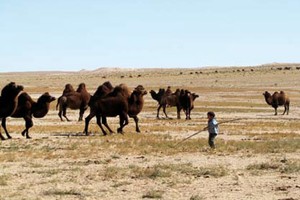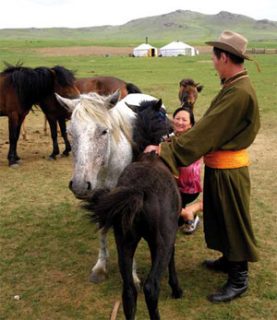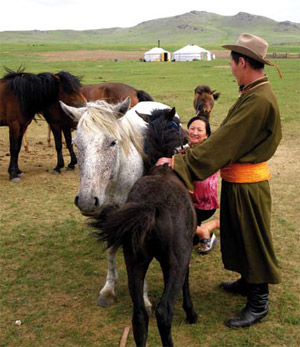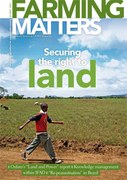What is the definition of a herder? Are you still a pastoralist if you move your ger (the herders’ tent) only twice a year? And what if you start growing crops? With an increasing number of competing land claims, Mongolian herders are changing their lifestyles, and this is leading to their position in society being reconsidered. If existing regulations do not support them, should new ones be put in place?

Mongolian tax law defines a herder family as “one or more persons acquiring most or all of their income from animals and following their animals around for most of the year”.
All herder families are registered in one of the country’s soums (or villages), and they only pay taxes if they have permanent winter and spring shelters. If they leave their soum, they have to pay a tax (per animal per day) to the governor of the other soum. But these regulations do not apply during the dzud, the common periods of harsh weather, when this tax is not valid, and herders are free to move to other soums in order to survive the winter with their animals.
Although families try to stay in one place during the winter and move to the next place in spring, in reality herder families often travel long distances throughout the country.
Land in Mongolia
The Mongolian Government owns all the land, but access to it and its use is changing drastically. Mining companies are increasingly exerting pressure on the government to allocate land for mining. Up until now, the government has made official agreements with these companies for one year, with the option of extending them on an annual basis. Other land claims come from Mongolian agricultural companies and private investors interested in growing grains. Many have obtained a 40-year agreement with the government to use a certain area of land, and many more have requested permits. Lastly, all Mongolian citizens can claim 0.07 hectares for their own house in and around Ulaanbaatar (or up to one hectare in other urban areas). Access to land seems to be clearly defined. But do herders also have the right to own land?
Herders have different animals in their flock. In the mountainous areas they herd goats, sheep, cows, yaks and horses, while in the Gobi desert most families also own camels. Cashmere, the fine wool of the goats, is one of the main sources of income; goats can survive well in Mongolian conditions and their meat is not highly prized, so the size of flocks is continually increasing. The goats graze the pastures intensively, even removing the roots of plants. This inhibits plant re-growth and creates completely barren spaces. As a result, the quantity and quality of the pastures are decreasing while the total number of animals increases. This is particularly the case in the vulnerable areas in the Gobi, where herders have to move many times a year to ensure sufficient feed for their herds.
Government officials explain that there is no law related to herders using pastures. Herders can own the place where they build a winter or spring shelter for their animals, with an undefined surface area, if they register this with the local government. All pastures can be freely used by all those who need them, which has led to severe degradation in large parts of the country. New attempts to prevent degradation and improve pasture yields are currently being tried by the central government, and these will directly influence the herders’ relationship with the land.
A changing context

Since 2008, the Mongolian government has been running specific projects to stop the degradation of pastures and improve their use. These are being tried in most aimags (provinces) and involve different organisations.
One initiative, supported by the Asian Development Bank and the Japan Fund for Poverty Reduction (ADB/ JFPR), is the “Water point and extension offices for poor herding families” project. This helps herders to form an organisation, receive a water access point (for which they must meet 10% of the costs themselves), make pasture-use plans and follow specific business-related courses. In short, herders
- form their own group with families that want to work together;
- choose a group leader, a water point representative and a pasture expert from among the group members;
- jointly make a business plan, start up new businesses with funds from the project and work together (in selling their produce);
- work together to improve their pastures, signing an agreement with the government to secure exclusive land use rights and access to those pastures.
Extension offices are being established in every soum to support this programme.
The first results of the project show that this multidimension approach is working well. Since 2008, 75 herder groups have been established (each of about 8 to 12 families). All of them have received funds from the project to develop alternative sources of income, become legal entities (such as NGOs and co-operatives), and opened bank accounts. Sixtyeight business plans have been approved and, with the implementation of these plans, 700 herder families are earning an income from other sources.
Some of these newly established businesses – such as growing potatoes, establishing a greenhouse or breeding livestock – are related to agriculture. Others – such as sewing dresses, making felt products and starting a bakery – are non-agricultural. In some cases, these businesses have resulted in a job for those who lost most or even all of their animals during a harsh winter; in others they are helping families to improve their diets by providing fresh vegetables, or increasing the income the family can spend on buying food.
All the groups have developed land use plans for the sustainable use of their pastures. The project also distributed fences to all groups, enabling them to set aside certain areas from which to cut hay for the winter. With this hay, more animals are able to survive the harsh winter.
Most importantly, this decreases pressure on the surrounding pastures, leading to better grass growth during the summer and autumn. The tripartite agreement signed with the local government and the project secures the groups’ land rights for several years, guaranteeing that they will be able to pasture their animals the following year, and that other herders will not be able to use that area for grazing their animals.
Is this all for the better?
Herder groups are reacting in a positive way to the changes that the project is bringing: “Before this project started, I lived with my family in my ger and the other people lived far away from us. We hardly saw them and were very isolated.” A female group leader explains how “now that we have regular meetings, we try to live near each other, and work together on many activities, such as making shelters and selling products.” Another 50-year old group leader sighs: “I wish I was 20 years younger so I could use all the possibilities I have now with much more physical energy and strength…”. They all recognise the benefits of their new economic activities, and also see that they can limit the number of livestock they keep and therefore the pressure on the pastures. But this also means making a change in their livelihoods.
As part of the project, herders have learnt about land rights and now know how to use their lands in a more intensive way. They will not enter the pastures of others, as they know how much effort it takes to grow crops or grasses themselves. They now stay in their own area throughout the year, as they have more options for making a living besides herding. But herders in other parts of the country, who are not involved in the project, are still moving around, leading to frictions and degraded pastures, especially in the provinces where pastures are (still) better.
Project participants think that there should be more regulations related to the sustainable use of pastures. This would help them to know what to expect in the future and to make investments to improve their area. However, this would mean that the local agreements created by the project would need to be supported by wider laws and regulations, applicable to the whole country.
Laws and regulations can help farmers and herders to use their lands in a more sustainable and productive way. They can also “protect” them against the interests of mining companies and large-scale agricultural producers. But does this mean that Mongolia needs more laws encouraging herders to settle?
Text: Dorieke Goodijk and Budsuren Tumendemberel
Budsuren Tumendemberel (tumen62@yahoo.com) works as a small-scale business development expert in the ADB/ JFPR project.
Dorieke Goodijk (dorieke.goodijk@gmail.com) worked on the agricultural income generation/added value aspects of the project.


